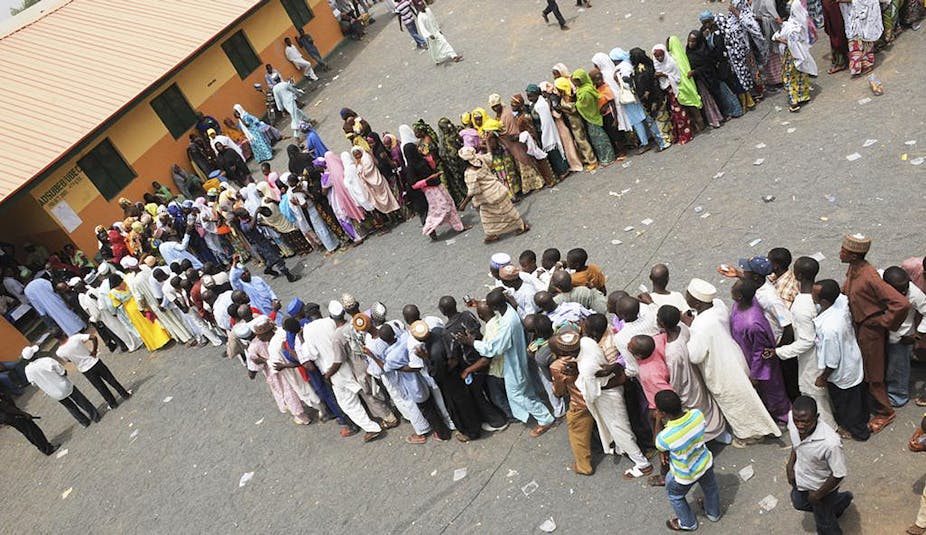Nigerians are set to go to the polls in the first of two sets of elections to choose the president, national assembly and state legislators. Olayinka Ajala sets the scene for Africa’s largest democratic undertaking and highlights the main logistical and political challenges that come with it.
How many Nigerians are registered to vote, and what are their main demographics?
There are 84,004,084 registered to vote in the 2019 election in 36 states and the federal capital territory, Abuja. Of this number, more than 15 million are new voters.
Young voters form a clear majority. More than half of the registered voters – 51.11% – are aged between 18 and 35; 29.97% are between 36 and 50; 15.22% are between between 51 and 70, and 3.69% are older than 70.
Although the electoral commission has not released the total breakdown of the registration in the final register, more women than men registered to vote in the 2019 elections for the first time.
In terms of regional distribution of voters, The Northwest region has the highest number of registered voters constituting 24% of the total registered voters. It is followed by the Southwest region 19.39%, North-central region 15.91%, South-south region 15.29%, North-east region 13.44% and the South-east region with 11.97% of registered voters.
What candidates are voters choosing at national and state level?
There are four categories of candidates on the ballot. The position of the president, the national assembly (senate and house of representatives), the state governorship positions and the states houses of assembly. Apart from the presidential elections, 29 of the country’s 36 states will be voting for governorship positions. Furthermore, 109 senate seats as well as 360 seats in the house of representatives will be contested. It has also been confirmed that 73 presidential aspirants will be contesting in the elections.
The presidential and national assembly elections will be held on 16 February, while the governorship and houses of assembly polls will be conducted on 2 March. With the “not too young to run bill” recently signed into law, the presidential age limit has been reduced from 40 to 30. For gubernatorial and senate positions the age limit was lowered to 30 from 35. For federal and states’ houses of assembly the lower age limit is 25 years, down from 30.
The “first past the post” system is used in Nigeria. This means that the candidate with the highest number of votes who also garners a minimum of 25% of votes in at least 24 (two-thirds) of Nigeria’s 36 states is declared the winner.
If there is no outright winner in the first round, the law stipulates that a runoff between the top two candidates by national tally must be held within seven days. Victory in a runoff will be by simple majority.
In the other elections, anyone that has the majority of votes is declared winner.
What are the biggest challenges to a free and fair election?
There are a number of challenges to a free and fair election in Nigeria. First, it’s difficult to get adequate security in 119,974 polling units across the country. This is because the security personnel are already overstretched with large numbers of officers deployed to conflict areas within the country.
If there are security challenges such as snatching of ballot boxes, destruction of voting materials, under age voting, inability to conduct elections in polling areas or attack on electoral officers in many polling units, then the elections in those units might be cancelled. These issues have occurred regularly in previous elections due to lapses in security.
Vote buying is another major challenge. Party agents are known to induce voters with offers of cash for votes. This was particularly visible during the two gubernatorial elections in Ekiti and Osun states conducted in 2018. During both elections, party agents were openly canvassing for votes in return for cash outside the polling booths. Social media platforms have also been used to solicit for payments for votes in recent elections.
Third, areas of the country recently ravaged by conflicts could witness low voter turnout that could have an impact on the outcome of the election. The conflicts between farmers and herdsmen in the North Central and Boko Haram insurgency in the North-Eastern regions have resulted in displacement of thousands of people who might be unable to vote. A recent increase in the attacks of Boko Haram and its affiliates has created anxiety in the areas where the attacks have taken place.
Fourth, the malfunctioning of the voter card readers required to verify voters cards could be a serious issue. In 2015, there were widespread reports of card reader malfunction across the country and there will be a lot of focus on the role of this device in the 2019 elections.
Finally, the problem of underage voting has been a major issue in previous elections. This issue gained a lot of social media attention during the 2018 local government elections in Kano state as children across the states voted unhindered during the polls. Although the INEC has promised to prevent such occurrence in the 2019 elections, there will be a lot of scrutiny on this issue during the elections.

